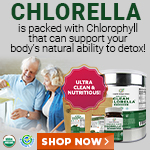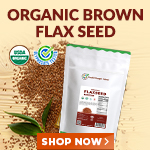Use these natural remedies to enjoy a more comfortable menopause
Saturday, July 26, 2014 by: Reuben Chow
Tags: menopause, natural remedies, women''s health

- Newly released JFK files reveal Pentagon's role in creating Lyme disease and covid in the same lab
- Trump's greatest betrayal so far: Accelerating Middle East wars, silencing dissent, and serving Zionist masters
- The hidden dangers in your kitchen: How cooking methods impact diabetes, cancer and aging
- STARDUST, a secretive Israeli-US startup, plans risky solar geoengineering experiment to BLOCK OUT THE SUN
- DEADLY DECEPTION: How COVID vaccines increased mortality rates and why authorities hid the truth
- Arkansas embraces medical freedom with landmark ivermectin law
- Lab leak confirmed? Boris Johnson's stunning reversal on COVID origins sparks global debate
- CDC finally halts $11 billion COVID funding scam as health officials admit the ‘pandemic’ was a fraud
- Home gardening for preppers: A beginner's guide to growing your own food
- Unraveling the paradox: Why intelligent individuals fall prey to everyday blunders
- GAIN-OF-FUNCTION CAT-BIRD-FLU now on the rise as nearly a dozen cats in Colorado "test positive" for Bird Flu due to contaminated cat food
- YouTube’s double standard: CEO defends censorship while claiming free speech champion status
- “Feel G.O.O.D. Gut Health Program” on BrightU: Why elimination diet is good for you
- Cartels shift tactics: Kidnappings and organ trafficking surge as border crossings plummet under Trump policies
- Why you should think twice before buying mainstream toothpaste formulas
- “Rent-a-womb” scandal: How China is exploiting U.S. birthright citizenship for long-term espionage
- Record honeybee deaths devastate U.S. agriculture, pesticides under scrutiny
- Was JFK's assassination orchestrated by a CIA double agent? New evidence points to James Angleton as the “architect”
- Newly released JFK files reveal Pentagon's role in creating Lyme disease and covid in the same lab
- Elon Musk: Aliens could be here on Earth RIGHT NOW
- Reclaim your health: How midlife exercise reverses years of inactivity
- Trump reverses course on Gaza plan, says “nobody is expelling Palestinians”
- EPA advisor admits the agency is funneling billions to climate groups ahead of Trump’s return to White House
- Big Pharma's $8 Billion bribery scheme exposed: how doctors are pushed to prescribe junk science, not heal
- Space war brewing? Russia threatens to destroy Starlink satellites
- A lack of integrity in Academia: Harvard professor found GUILTY of fraudulent research to promote CRT theory
- Survival 101: Effective EMF blocking techniques
- Rep. Nancy Mace introduces bill to ban biological males from female facilities on federal property
- Mike Adams Sermon 66: God will DESTROY ISRAEL for its wickedness
- Pilots report mysterious lights 'moving at extreme speeds' across Oregon skies
- 5 Simple steps to boost your brainpower: How to strengthen executive function in a distracted world
- Historian warns Israel may be entering an “IRREMEDIABLE DECLINE”
- Florida takes a stand: DeSantis proposes permanent ban on mRNA vaccine mandates
- RFK Jr.'s SSRI antidepressant investigation sparks liberal meltdown, exposes Big Pharma's dangerous game
- OpenAI whistleblower who dissented against how the company trained ChatGPT found dead
- Sugarcane extract superior to cholesterol-lowering drugs?
- EPA advisor admits the agency is funneling billions to climate groups ahead of Trump’s return to White House
- The Health Ranger releases “Vaccine Zombie” song and music video, using AI-animated zombies for the music video
- California's social media censorship law struck down: A victory for free speech or a threat to online safety?
- Dr. Mike Yeadon releases 15-minute testimony - WATCH - about genocidal intent of COVID “vaccines”
- The pandemic as a tool for INDOCTRINATION: Understanding “The Indoctrinated Brain” by Dr. Michael Nehls
- Mike Adams releases country western hit single: Goin’ Back in Time is Comin’ Home
- Mike Adams releases music poetry sensation: A Child of God
- RFK Jr. clears key hurdle: Sen. Susan Collins backs controversial HHS nominee, signaling a new era for health policy
- Florida takes a stand: DeSantis proposes permanent ban on mRNA vaccine mandates
- Unpacking the Lies That We’ve Been Fed – new song and music video released by Mike Adams, the Health Ranger
- Mike Adams releases new song and music video: Nothing More Disgusting Than a Globalist
- Congratulations to the FULLY UNVACCINATED as you resisted the COVID-19 PROPAGANDA MACHINE fueled by over $100 BILLION
- “Why we influenced the 2020 elections”: Facebook files reveal the coordinated effort to bury the Hunter Biden laptop story
- Michigan sheriff announces criminal investigation into 2020 election crimes, Dominion Voting Systems
- Israeli soldiers accused of even more torture and abuse in the West Bank
- Migrants are taking advantage of recent hurricanes to scam residents and loot their homes
- House Intelligence Committee calls for the ARREST and PROSECUTION of Dr. Anthony Fauci
- Peter Rost exposes Big Pharma corruption in his book “The Whistleblower: Confessions of a Healthcare Hitman”
- Red Cross issues warning to stop blood plasma donations from vaccinated people
- Scientists confirm: GENIUS brain function can be spontaneously unleashed in humans without any apparent cause
- EPA advisor admits the agency is funneling billions to climate groups ahead of Trump’s return to White House
- HYSSOP: What research reveals about the health benefits of this ancient holy herb
- Two containers with completed ballots fall out of truck in Florida
- Fully vaccinated about to see “tsunami” of illness and death, warns virologist
- Global leaders unite to clamp down on “misinformation” with UN-backed Cascais Declaration
- BREAKING: 2025 NDAA authorizes mandatory military draft of WOMEN across America… as Pentagon pursues global NUCLEAR war with both Russia and China at the same time
- Michael Yon warns of a ZIONIST TAKEOVER in Trump’s second administration
- BOMBSHELL: DNA testing kits are a SCAM to develop ethnic-specific bioweapons
- Ozempic and Wegovy weight loss drugs are injectable LIZARD VENOM PEPTIDES that may unleash a devastating wave of organ failure… side effects align with symptoms of SNAKE BITES
- Israeli soldiers accused of even more torture and abuse in the West Bank
- These 13 countries just signed an agreement to engineer a global FAMINE by destroying food supply
- NASA admits that climate change occurs because of changes in Earth’s solar orbit, and NOT because of SUVs and fossil fuels
- RFK Jr. clears key hurdle: Sen. Susan Collins backs controversial HHS nominee, signaling a new era for health policy
- Sermon 30: How Jesus reveals Caesar’s FAKE CURRENCY and FALSE AUTHORITY
- Coriander seeds: Ancient medicine backed by modern science
- Arizona officials claim Maricopa County needs 10-13 days to tabulate results of the election
Menopause itself comes about when there are no more active eggs remaining in the ovaries, either through normal aging or due to surgery or chemotherapy. In the United States, it is estimated that 65-80% of women going through menopause suffer from hot flashes to some extent. Here's what you can eat to make for a smoother menopausal journey.
Angelica
Dong quai, or Chinese angelica, is a well known herb in Asia which is widely regarded as a useful "female" remedy. It has been used to treat various symptoms of menopause, in particular hot flashes. In fact, it also helps with painful menstruation, lack of menstruation and too-frequent menstruation.Dong quai's ability to deal with hot flashes could be due to the herb's mild estrogenic properties plus its ability to stabilize blood vessels.
Licorice
Licorice contains natural estrogen-like compounds. Glycyrrhizin, licorice's active compound, seems to have the ability to regulate estrogen levels in women, lowering it when it is too high and raising it when it is too low.Licorice and licorice extracts are safe when used in moderate amounts, but long-term or high-dose intake could produce adverse reactions such as high blood pressure, headaches and lethargy. James Duke, PhD, wrote that "a safe daily dose of a true licorice confection is said to be five grams, or less than a quarter-ounce."
Black cohosh
The American Indians used black cohosh to treat menstrual cramps and menopausal symptoms, and modern science has validated this herb's ability to help with both painful menstruation and menopause. Clinical studies have revealed that a special extract of black cohosh standardized to contain 1 mg of triterpenes help relieve hot flashes, depression and vaginal atrophy.One particular big study showed that intake of black cohosh extract helped to significantly improve menopausal symptoms in more than four out of every five patients within six to eight weeks. These symptoms included ringing in the ears, heart palpitations, heavy sweating, vertigo, hot flashes, headaches and even nervousness or irritability. Most of the study subjects actually experienced noticeable improvements within four weeks. The herb was generally well-tolerated, with only 7% of the women saying they had mild transitory stomach issues.
Foods to eat
According to Michael Murray, ND, the main dietary recommendation to help reduce menopausal symptoms is to raise one's intake of plant foods, in particular those rich in phytoestrogens, while cutting down on animal foods. Phytoestrogens are plant compounds which could partially replace the effects of estrogen that the woman's body no longer produces. They could also bind to estrogen receptors.Dr. Murray wrote that a high-phytoestrogen diet could be the reason why hot flashes and other symptoms of menopause often do not occur in cultures where the people consume mainly plant-based foods. Consuming more phytoestrogens in one's diet not only helps alleviate hot flashes but also boosts vaginal cell maturation and prevents osteoporosis.
Phytoestrogen-rich foods include flaxseeds, nuts, fennel, celery, parsley, alfalfa, whole grains and apples.
Vegetables in the cabbage family, such as broccoli, cabbages, Brussels sprouts, collards, kale and mustard, are also useful dietary choices for ladies going through menopause, as they are rich in nutrients which improve bone health, including calcium, magnesium and folic acid. These vegetables help prevent heart disease and breast cancer, too.
A doctor of natural health shares some home remedies for menopause here.
Sources for this article include:
Murray, Michael, ND, and Pizzorno, Joseph, ND. Encyclopedia of Natural Medicine. 2nd ed. New York, NY: Three Rivers Press, 1998. Print.
Murray, Michael, ND., Pizzorno, Joseph, ND., and Pizzorno, Lara, MA, LMT. The Encyclopedia of Healing Foods. New York, NY: Atria Books, 2005. Print.
Duke, James A., PhD. The Green Pharmacy. New York, NY: Rodale, 1997. Print.
About the author:
Reuben Chow has a keen interest in natural health and healing as well as personal growth.
Subscribe to his natural health newsletter or follow his health websites on Facebook.
His main health websites Insights on Health and All 4 Natural Health focus on being healthy naturally, while his other health websites cover topics such as cancer, depression, holistic depression help, as well as omega 3 fatty acids. He also owns self improvement and inspirational websites like Inspiration 4 Living, allinspiration.com, Life Changing Quotes, and 101 Inspirational Ideas. Through his network of sites at The Journey of Life, he hopes to help improve people's lives.
Menopause at FETCH.news
Get independent news alerts on natural cures, food lab tests, cannabis medicine, science, robotics, drones, privacy and more.
Take Action: Support Natural News by linking to this article from your website
Permalink to this article:
Embed article link: (copy HTML code below):
Reprinting this article:
Non-commercial use OK, cite NaturalNews.com with clickable link.
Follow Natural News on Facebook, Twitter, Google Plus, and Pinterest
Science News & Studies
Medicine News and Information
Food News & Studies
Health News & Studies
Herbs News & Information
Pollution News & Studies
Cancer News & Studies
Climate News & Studies
Survival News & Information
Gear News & Information
News covering technology, stocks, hackers, and more



"Big Tech and mainstream media are constantly trying to silence the independent voices that dare to bring you the truth about toxic food ingredients, dangerous medications and the failed, fraudulent science of the profit-driven medical establishment.
Email is one of the best ways to make sure you stay informed, without the censorship of the tech giants (Google, Apple, Facebook, Twitter, YouTube, etc.). Stay informed and you'll even likely learn information that may help save your own life."
–The Health Ranger, Mike Adams












































